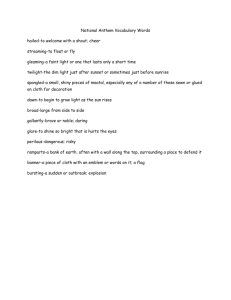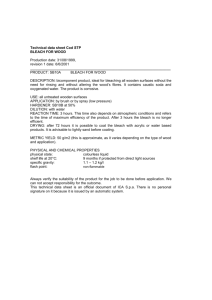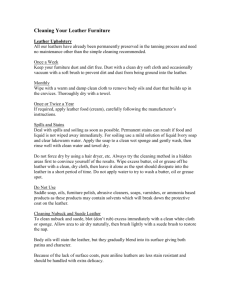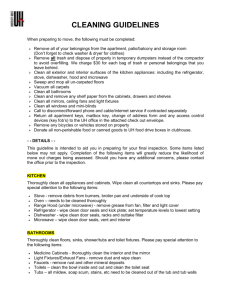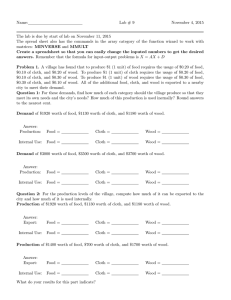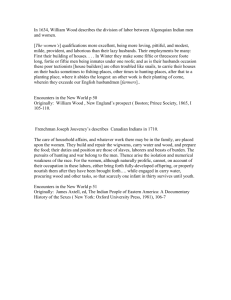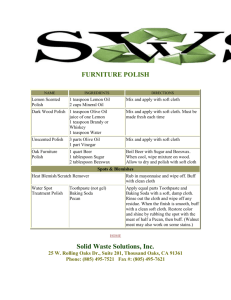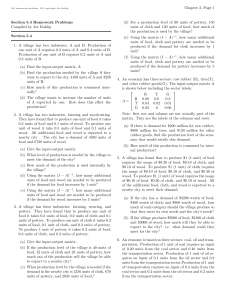What to do After a Fire
advertisement
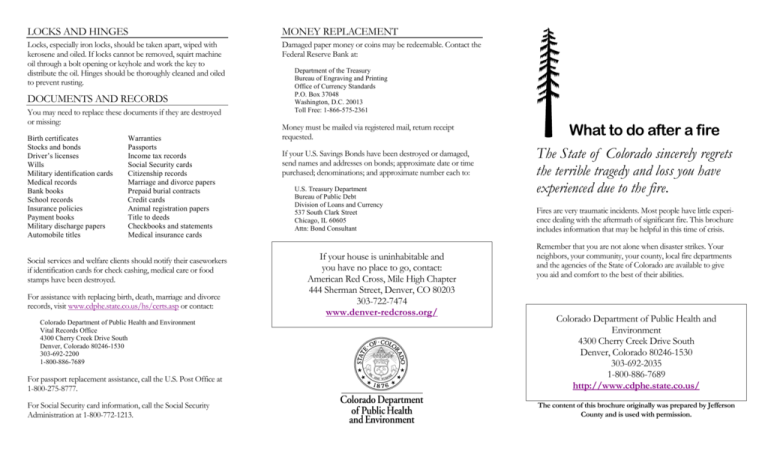
LOCKS AND HINGES MONEY REPLACEMENT Locks, especially iron locks, should be taken apart, wiped with kerosene and oiled. If locks cannot be removed, squirt machine oil through a bolt opening or keyhole and work the key to distribute the oil. Hinges should be thoroughly cleaned and oiled to prevent rusting. Damaged paper money or coins may be redeemable. Contact the Federal Reserve Bank at: DOCUMENTS AND RECORDS You may need to replace these documents if they are destroyed or missing: Birth certificates Stocks and bonds Driver’s licenses Wills Military identification cards Medical records Bank books School records Insurance policies Payment books Military discharge papers Automobile titles Warranties Passports Income tax records Social Security cards Citizenship records Marriage and divorce papers Prepaid burial contracts Credit cards Animal registration papers Title to deeds Checkbooks and statements Medical insurance cards Social services and welfare clients should notify their caseworkers if identification cards for check cashing, medical care or food stamps have been destroyed. For assistance with replacing birth, death, marriage and divorce records, visit www.cdphe.state.co.us/hs/certs.asp or contact: Colorado Department of Public Health and Environment Vital Records Office 4300 Cherry Creek Drive South Denver, Colorado 80246-1530 303-692-2200 1-800-886-7689 For passport replacement assistance, call the U.S. Post Office at 1-800-275-8777. For Social Security card information, call the Social Security Administration at 1-800-772-1213. Department of the Treasury Bureau of Engraving and Printing Office of Currency Standards P.O. Box 37048 Washington, D.C. 20013 Toll Free: 1-866-575-2361 Money must be mailed via registered mail, return receipt requested. If your U.S. Savings Bonds have been destroyed or damaged, send names and addresses on bonds; approximate date or time purchased; denominations; and approximate number each to: U.S. Treasury Department Bureau of Public Debt Division of Loans and Currency 537 South Clark Street Chicago, IL 60605 Attn: Bond Consultant If your house is uninhabitable and you have no place to go, contact: American Red Cross, Mile High Chapter 444 Sherman Street, Denver, CO 80203 303-722-7474 www.denver-redcross.org/ What to do after a fire The State of Colorado sincerely regrets the terrible tragedy and loss you have experienced due to the fire. Fires are very traumatic incidents. Most people have little experience dealing with the aftermath of significant fire. This brochure includes information that may be helpful in this time of crisis. Remember that you are not alone when disaster strikes. Your neighbors, your community, your county, local fire departments and the agencies of the State of Colorado are available to give you aid and comfort to the best of their abilities. Colorado Department of Public Health and Environment 4300 Cherry Creek Drive South Denver, Colorado 80246-1530 303-692-2035 1-800-886-7689 http://www.cdphe.state.co.us/ The content of this brochure originally was prepared by Jefferson County and is used with permission. What to do after a fire There are several professional fire damage restoration companies listed in the Yellow Pages under fire and water damage restoration. When severe damages have occurred in either residential or commercial buildings, it may be worthwhile to have one or more of these professionals provide estimates to assist with problems associated with cleaning up after a disaster. You should check with your insurance company to determine whether this type of service is covered by your policy. Check to be sure that the insurer will accept billing from the restoration company or will reimburse you. INSURANCE Call your insurance agent or carrier as soon as possible. Confirm that your insurance company will take care of boarding up your property and other security matters. If you rent, call your landlord, who can contact insurance carriers for the property. Do not settle claims or sign releases too quickly. Make sure that your insurance agent or adjuster knows all of your losses. Even if your home has sustained only minor damage, you may discover that much more laundry and cleaning are necessary, due to smoky odors and fine smoke particles found in draperies, bedding, pillows, carpets, furniture and wall coverings. It may take some time before you discover all items that are missing or destroyed. It may be difficult to recall all of your accumulated items in the short space of time following a fire. If your insurance agent requires a copy of the fire report, stop by your local fire department to obtain a copy. FOOD If your home has lost power, you can save frozen foods by keeping the freezer closed. It has enough insulation to keep food frozen for at least one full day, and possibly up to two or three days. Refrigerated foods that have been held above 41°F for more than four hours should be discarded. As soon as possible, move frozen food to a locker or a friend’s freezer. Wrap the items in newspapers or blankets and pack in boxes during transport. UTILITIES AND APPLIANCES RUGS AND CARPETS In actual fire situations, firefighters immediately shut off gas and electricity. If severe damage occurs, utilities will have to remain off until determined to be safe by the utility company. Only the utility company will restore gas service. Do not attempt to turn on the gas yourself. In addition, electrical service must be inspected. Don’t run wet appliances until you have had a professional check them. If damaged, improper grounding or short-circuiting may result in property damage or safety hazards. Rugs and carpets should be allowed to dry thoroughly, as quickly as possible. Lay them flat; expose them to warm, dry, circulating air. A fan can help speed drying. Even though the surface of the rug or carpet may appear dry, any moisture remaining at the base of the tufts can quickly rot a rug. Clean dried throw rugs by beating, sweeping or vacuuming, and then shampooing. For more information, call your carpet dealer or installer. COOKING UTENSILS Pots, pans and flatware should be washed with strong, soapy water, then rinsed with water and polished with a fine powder cleaner. Clean copper and brass with salt sprinkled on a vinegarsaturated cloth. CLOTHING Smoke odor and soot often can be washed from clothing. This formula is safe for clothing that can be bleached: 4-6 tsp. laundry detergent 1 cup Lysol or household chlorine bleach 1 gallon water Mix well; add clothes; rinse with clear water; dry well. NEVER mix chlorine bleach with anything other than water and laundry detergent. Chlorine bleach mixed with ammonia or any number of other chemicals can result in toxic fumes with serious, potentially fatal results. To remove mildew, wash the fresh stain with soap and water. Then rinse and dry in the sun. If the stain isn’t removed, use lemon juice and salt; or try one tbsp. bleach to one pint lukewarm water. Test colored garments before using any treatment. FLOORING When water gets underneath vinyl flooring, it can cause odors, warp the wood underneath and eventually cause the floor to lift. If water has penetrated, call your flooring dealer for suggestions on removing or loosening the remaining adhesive without damage to the covering. If you remove the covering, let the wood dry thoroughly before replacing the flooring. WOOD Damaged wood furniture or fixtures may be salvageable. First, clean off mud or dirt. Remove drawers and dry them thoroughly to prevent warping. Scrub with a soft brush and mild cleaning solution; use a soft cloth to wipe dry. Dry thoroughly to help prevent decay and mold. Open doors and windows, and use a fan to circulate air. If mold forms, wipe the wood with a soft cloth soaked in a mixture of water and kerosene or try borax dissolved in hot water. Avoid drying wood furniture in the sun to prevent warping or twisting. To remove white spots or film, rub the wood surface with a cloth soaked in a half-cup of household ammonia per half-cup water solution, then wipe dry and polish with wax, or rub the surface with a cloth soaked in a solution of a half-cup turpentine and a half-cup linseed oil. USE CAUTION – these materials are flammable. An alternative is to rub the wood surface with a 4/0 steel wool pad dipped in liquid polishing wax. Wipe with a soft cloth and then buff. LEATHER Wipe your leather goods with a damp cloth, then with a dry cloth. Stuff your purses and shoes with newspapers to retain shape. Leave your suitcases open. Leather goods should be dried away from heat and sun. When dry, clean with saddle soap. For suede, try steel wool or a suede brush. Rinse leather and suede jackets in cold water and dry away from heat and sun. BOOKS Dry books by placing them on end with pages separated, then pile and press them to prevent mildew until the books are thoroughly dry. A fan may help speed drying. If books are still damp, sprinkle cornstarch or talcum powder between the pages, leave for several hours, then brush off.
